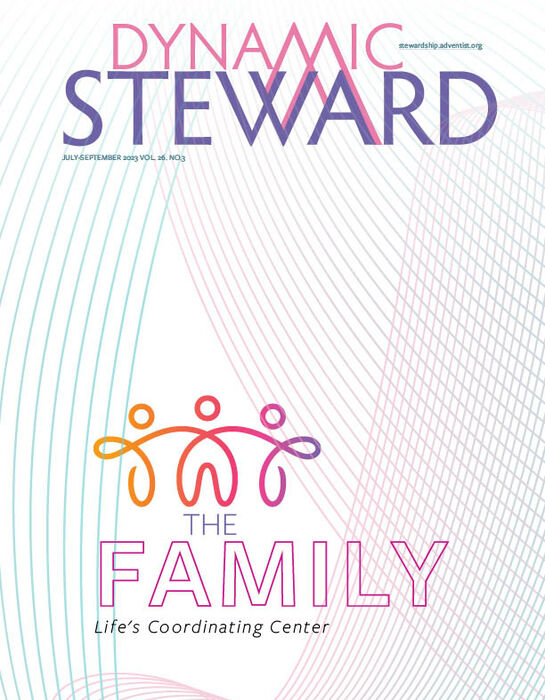Learning to Handle Finances during Marriage Preparation
Anna and Samuel sat at the table in the café, planning their wedding. They were so in love. Anna had warmly accepted Samuel’s proposal, and now they were trying to create a wedding where they would commit themselves to each other for life. They wanted this celebration of their love to be a blessing to everyone involved, especially their families.
Anna and Samuel met at an Adventist boarding school in Africa. Anna was teaching English and assisting the girls’ dean. She came from a financially comfortable European family. Samuel was a sports teacher from South America. He was one of nine children, and money had always been scarce. They connected so well, at a deeply spiritual level, as friends who loved to have outdoor adventures together, and now as a couple, who wanted to blend their lives together. But it wasn’t so easy to work together when money was part of the equation.
And now, as they tried to shape a simple and meaningful marriage ceremony and plan how they would live together afterward, they were beginning to experience their first conflict. They sat in awkward silence, not quite knowing how to navigate the uncertain territory of couple finances. They felt tense and anxious as they shared their thoughts and ideas. This was not what they had expected. Everything else in their relationship felt so smooth, so natural, so wonderful. But nothing in their lives had prepared them for the painful challenge of talking about their finances.
Anna wanted to show generosity to all their guests by providing something that Samuel thought was a waste of money. Samuel was sad that many of his relatives would not be able to afford to travel to a wedding in Europe. Anna wanted the wedding to be in her home church because that was her family’s cultural expectation. Samuel expected to manage all the family finances and make all the purchases for the home because that’s what his father had always done. His mother had never worked outside the home, but Anna wanted to continue her profession as a teacher. She also felt strongly about each of them having an allowance each month that they could spend as they wished. Samuel expected to save up and pay for a car. Anna didn’t mind making monthly payments on a vehicle or home.
Family finances are complex and stressful for most couples, and money is the cause of most couple conflicts. Money is not just the currency exchanged in transactions. It has many different meanings and memories for each person, in each context, in each family, and in each culture. Having money can mean things like security, hope, love, power, trust, identity, and even a sense of entitlement. Not having enough of it can mean poverty, suffering, stress, dependence, and powerlessness. Following the same financial pattern as our parents may be an important way to show respect and family loyalty. But as the world changes and we marry people with different financial perspectives, rigidly following traditional financial habits also can be disastrous.
Before a couple gets engaged, it’s important for them to notice and discuss how each of them relates to money. As finances can be a sensitive and personal topic for many people, it’s best to ask positive questions, focused on each other’s strengths, values, hopes, and joys, rather than ask critical and hurtful questions. Gentle discussions can help them to build a safer foundation for discussing their financial issues, so that they can grow in confidence and be lovingly honest with each other.
Premarital Discussion Questions about Finances
Here are some financial questions for couples to ask each other. Or they can pay attention when their loved one is managing money and watch how they respond to financial issues. Then they can ask gentle and positive questions relating to what they have noticed. It’s important to warmly affirm what they like and be gently curious about what they find difficult to understand: “I just noticed that you did . . . , and I’m curious about what that meant for you,” or something similar.
- What useful things have you learned about spending, saving, and using money from your family?
- What does money mean to you?
- How would you choose to manage your family finances differently from the way that your parents managed their finances?
- Which 3–4 of your values and principles help you to make your financial decisions?
- What do you enjoy spending money on the most?
- What are your beliefs about saving money? What helps you to save money? What’s the most enjoyable thing that you ever saved up for?
- What helps you to make wise decisions about managing and saving your money?
- How do you use your money to bless others?
- What would help you to be open and honest about your finances in our marriage?
- What’s the worst mistake that you’ve ever made in relation to your finances, and what have you learned from that?
- What’s the best decision that you’ve ever made in relation to your finances, and what have you learned from that?
- How will we share our resources fairly as a couple?
- What allowance shall we give to each other to spend freely without questions?
- How will we respond lovingly to our family members’ requests for financial support? What shall we do if we cannot afford to meet their demands?
- What are your greatest concerns about managing finances as a couple?
- What are your greatest hopes about managing finances as a couple?
Some people may prefer to have time to reflect and write down their answers. This can be useful for introverts and for those who speak different languages. Let the partners choose their best way to answer these questions if you are preparing them for marriage, and then discuss their answers together, as you guide them and help them to explore these important issues together. Make sure that there is a good gender balance in the discussions and that they work toward mutually acceptable solutions.
Biblical Values Connected to Finances
Anna and Samuel may have never thought about the biblical principles that can guide them as they manage their finances. Here are some topics to study and discuss with them:
- Prayer – How does prayer help you to use God’s money wisely? (Philippians 4:6,7)
- Gratitude – How will you thank God for His blessings, recognizing that everything you own is a gift from His loving hands? (1 Thessalonians 5:18)
- Trust – How will you trust God with your tithe and notice the blessings that come from tithing? (Malachi 3:10)
- Faith – How does your belief in God reduce your anxieties about material things? (Matthew 6:26–34; Philippians 4:19)
- Honesty – What will help you to be open and transparent about your use of money? (Matthew 5:37; Proverbs 19:1)
- Forgiveness – How will you forgive yourselves and each other for past and current financial mistakes? (Colossians 3:13)
- Stewardship – How will you provide wisely for the needs of your family, now and in the future? (Luke 16:10–12)
- Economy and Resourcefulness – How will you use your resources wisely? How will you learn to reuse and mend things instead of wasting them? (John 6:12)
- What systems will you use to save money for the future? (Proverbs 13:11; Matthew 25:27)
- What are your values about working with excellence and balancing work and rest? (Colossians 3:23, 24)
- Generosity – How will you plan to give generously so that you can share God’s love with others? (2 Corinthians 9:6–15)
- Sharing and Lending – How will you help others by lending things they need? How will you let things go, generously and graciously, if you don’t get them back? (Luke 6:35;
1 Timothy 6:17–19)
Financial Planning
Every marriage needs a balance of wise saving, wise spending, and wise giving. This complexity needs careful planning. Maybe Samuel is a wise saver, and Anna is a wise spender. They can each become the best and wisest they can be in their area of financial responsibility.
- Instead of thinking about money as “my money” or “our money,” think about it as “God’s money entrusted to us.”
- Create a budget together using a suitable online household budget template, to help the couple explore all their anticipated expenses.
- Set short, medium, and long-term financial goals together. Decide how much you want to save each month and how you will save for a long-term project, like buying a home.
- Work out a manageable plan for reducing any debts. Aim to owe less at the end of each month rather than more. Pay off any spending on cards each month so that debt does not increase and become unmanageable.
- If your money is in a muddle or you are struggling with a problem or debt, it’s important to find a good financial counselor. The sooner you address the problems, the easier it will be to solve them.
- When talking about money becomes difficult, reflect on why you feel embarrassed, angry, guilty, afraid, sad, ashamed, etc. Sometimes we buy things because we think they will make us feel better. It could be anything from a doughnut to a designer handbag. Try pausing before you purchase and asking yourself, “Why am I buying this? Is it what I really need? Or am I trying to fill an empty space in my heart?” Maybe you need a hug, some special time with your spouse, or some appreciation, comfort, encouragement, understanding, or support.
A Helpful Framework for Tricky Conversations:
- In this situation (be specific) . . . or When this happens (be specific) . . . I feel . . . and it would really help me if you would do . . . and then I can help you by . . . What ideas do you have that would help us with this?
Financial Experiments to Try as a Couple:
- For one month, only buy essentials, such as food and household items. Make do, mend, and borrow to fill the gaps. Discuss how that felt and how much you saved.
- Only buy things with cash for a month. Paying with “real money” gives you a clearer sense of how much you are spending.
- Buy any nonessential items from thrift stores, preloved online sale platforms, and garage sales.
- Make a list of “treats” for yourselves that don’t cost any money. Or “treat” yourselves by putting money into your savings account, so you’ll be able to do something wonderful in the future. The website www.thedatingdivas.com is created by Christians to help couples have low-cost fun together.
Other Help:
Download the Toucan Together app for relational help. One partner downloads and installs the app and then invites the other to join, to link their devices. This app has been made by Christians to provide a marriage retreat in your pocket! It has modules on conflict, communication, love, and managing finances. It is free, fun, and informative and helps couples to learn, share, and set goals together.


